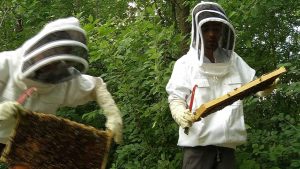Something to Buzz About: Hennepin Technical College Named ‘Bee Campus USA’
Tucked away among the trees behind Hennepin Technical College is a small patch of grass with two wooden boxes. The contents in those boxes have become a buzzworthy passion project for Kyle Hagberg and Ashley Schaaf.
“These are more experimental learning hives,” Hagberg said. “These are the ones that pollinate the gardens and that kind of stuff, and these are the ones that give the students specifically a real hands-on experience at keeping bees.”
Hagberg is no longer a student at Hennepin Tech and Schaff graduated this past May.
“Kyle trained me in last fall and I’ve been working with him all summer,” Schaff said.
The two keep coming back week-after-week to check on these hives because the classes they took at Hennepin Tech helped them develop a love of bees and a greater appreciation for the insects’ role in nature.

Ashley Schaaf and Kyle Hagberg examine a beehive on the Hennepin Tech campus.
“For me to be healthy, I need bees,” Schaff said. “So it’s an overall sustainability thing for sure.”
Hennepin Tech offers several associate degrees in its landscaping, greenhouse and garden programs. Supporting pollinators is part of the curriculum.
“I’ve been here 20 years, and every year I’ve added something to the program that makes it more sustainable, more exciting,” said Deb Kvamme, Hennepin Tech’s landscape/greenhouse instructor. “It’s not just about sitting in a classroom.”
A few years ago, Kvamme added beehives to the mix and had alumni take care of them.
“They really learn from being in the scene, and so I do a lot of that here,” said Kvamme. “And if you kind of just look in the campus, you’ll see all my little spots, and it’s for education.”
‘Bee Campus USA’
For all the work that Hennepin Tech has done with bees, the campus just received a prestigious designation: “Bee Campus USA,” the fourth Minnesota college to receive the honor, which comes courtesy of the nonprofit Xerces Society for Invertebrate Conservation.
Kvamme says it helps put the college on the map.
“It does. There isn’t a lot of two-year colleges that have this program,” she said.
“We just pride ourselves on being a safe haven for these pollinators, and specifically honey bees, which people seem to gravitate to,” said Hagberg.
Hagberg and Schaaf plan to keep coming back for the remainder of the summer to tend to these hives. Hagberg encourages others to support the cause.
“If we can take steps forward in increasing the health of each little part of the ecosystem, it can bring the whole thing up,” he said.


